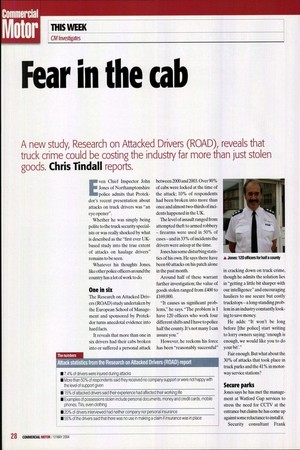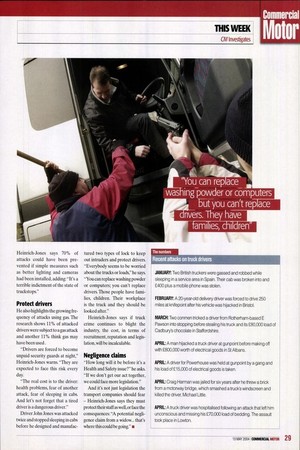Fear in the cab
Page 28

Page 29

If you've noticed an error in this article please click here to report it so we can fix it.
A new study, Research on Attacked Drivers (ROAD), reveals that truck crime could be costing the industry far more than just stolen
goods. Chris Tindall reports.
Even Chief Inspector John Jones of Northamptonshire police admits that Protekdor's recent presentation about attacks on truck drivers was "an eye opener".
Whether he was simply being polite to the truck security specialists or was really shocked by what is described as the "first ever UKbased study into the true extent of attacks on haulage drivers" remains to be seen.
Whatever his thoughts Jones, like other police officers around the country has a lot of work to do. One in six
The Research on Attacked Drivers (ROAD) study undertaken by the European School of Management and sponsored by Protekdor turns anecdotal evidence into hard facts. It reveals that more than one in six drivers had their cabs broken into or suffered a personal attack
between 2000 and 2003. Over 90% of cabs were locked at the time of the attack; 10% of respondents had been broken into more than once and almost two-thirds of incidents happened in the UK.
The level of assault ranged from attempted theft to armed robbery — firearms were used in 50% of cases— and in 33% of incidents the drivers were asleep at the time.
Jones has some disturbing statistics of his own. He says there have been 60 attacks on his patch alone in the past month.
Around half of these warrant further investigation; the value of goods stolen ranged from £400 to £169,000.
"It causes us significant problems," he says. "The problem is I have 120 officers who work four different shifts and I have to police half the county. It's not many I can assure you." However, he reckons his force has been "reasonably successful"
in cracking down on truck crime, though he admits the solution lies in "getting a little bit sharper with our intelligence" and encouraging hauliers to use secure but costly truckstops — a long-standing problem in an industry constantly looking to save money.
He adds: "It won't be long before [the police] start writing to lorry owners saying: 'enough is enough, we would like you to do your bit'."
Fair enough. But what about the 30% of attacks that took place in truck parks and the 41% in motorway service stations? Secure parks
Jones says he has met the management at Watford Gap services to stress the need for CCTV at the entrance but claims he has come up against some reluctance to install it. Security consultant Frank
Heinrich-Jones says 70% of attacks could have been prevented if simple measures such as better lighting and cameras had been installed, adding: "It's a terrible indictment of the state of truckstops." Protect drivers
He also highlights the growing frequency of attacks using gas. The research shows 11% of attacked drivers were subject to a gas attack and another 11% think gas may have been used.
"Drivers are forced to become unpaid security guards at night," Heinrich-Jones warns. "They are expected to face this risk every day.
"The real cost is to the driver: health problems, fear of another attack, fear of sleeping in cabs. And let's not forget that a tired driver is a dangerous driver." Driver John Jones was attacked twice and stopped sleeping in cabs before he designed and manufac
tured two types of lock to keep out intruders and protect drivers. "Everybody seems to be worried about the trucks or loads," he says. "You can replace washing powder or computers; you can't replace drivers. Those people have families, children. Their workplace is the truck and they should be looked after."
Heinrich-Jones says if truck crime continues to blight the industry, the cost, in terms of recruitment, reputation and legislation, will be incalculable. Negligence claims
"How long will it be before it's a Health and Safety issue?" he asks. "If we don't get our act together, we could face more legislation." And it's not just legislation the transport companies should fear — Heinrich-Jones says they must protect their stnff as well, or face the consequences: "A potential negligence claim from a widow... that's where this could be going." • Attack statistics from the Research on Attacked Drivers (ROAD) report • 7.4% of drivers were injured during attacks • More than 50% of respondents said they received no company support or were not happy with the level of support given • 15% of attacked drivers said their experience had affected their working life • Examples of possessions stolen include personal documents, money and credit cards, mobile phones, TVs, even clothing • 20% of drivers interviewed had neither company nor personal insurance • 55% of the drivers said that there was no use in making a claim if insurance was in place Recent attacks on truck drivers
JANUARY: Two British truckers were gassed and robbed while sleeping in a service area in Spain. Their cab was broken into and £400 plus a mobile phone was stolen.
FEBRUARY: A 20-year-old delivery driver was forced to drive 250 miles at knifepoint after his vehicle was hijacked in Bristol.
MARCH: Two conmen tricked a driver from Rotherham-based E Pawson into stopping before stealing his truck and its £80,000 load of Cadbury's chocolate in Staffordshire.
APRIL: A man hijacked a truck driver at gunpoint before making off with £800,000 worth of electrical goods in St Albans.
APRIL: A driver for Powerhouse was held at gunpoint by a gang and his load of £15,000 of electrical goods is taken.
APRIL Craig Harman was jailed for six years after he threw a brick from a motorway bridge, which smashed a truck's windscreen and killed the driver, Michael Little.
APRIL A truck driver was hospitalised following an attack that left him unconscious and missing his E70,000 load of bedding. The assault took place in Lowton.




















































































































































































































